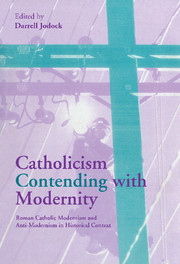 Catholicism Contending with Modernity
Catholicism Contending with Modernity Book contents
- Frontmatter
- Contents
- List of contributors
- Acknowledgments
- List of abbreviations
- Note on the text
- Introduction I: The Modernist crisis
- Introduction II: The Modernists and the anti-Modernists
- PART I THE LATE NINETEENTH-CENTURY SETTING OF MODERNISM AND ANTI-MODERNISM
- PART II MAURICE BLONDEL AND ALFRED LOISY IN FRANCE
- 4 Seeking transcendence in the modern world
- 5 Blondel's Action and the problem of the University
- 6 The politics of Loisy's Modernist theology
- 7 Innovation and biblical interpretation
- PART III FRIEDRICH VON HÜGEL AND MAUDE PETRE IN ENGLAND
- PART IV SOCIAL MODERNISM AND ANTI-MODERNISM IN FRANCE
- Conclusion
- Index
5 - Blondel's Action and the problem of the University
Published online by Cambridge University Press: 30 October 2009
- Frontmatter
- Contents
- List of contributors
- Acknowledgments
- List of abbreviations
- Note on the text
- Introduction I: The Modernist crisis
- Introduction II: The Modernists and the anti-Modernists
- PART I THE LATE NINETEENTH-CENTURY SETTING OF MODERNISM AND ANTI-MODERNISM
- PART II MAURICE BLONDEL AND ALFRED LOISY IN FRANCE
- 4 Seeking transcendence in the modern world
- 5 Blondel's Action and the problem of the University
- 6 The politics of Loisy's Modernist theology
- 7 Innovation and biblical interpretation
- PART III FRIEDRICH VON HÜGEL AND MAUDE PETRE IN ENGLAND
- PART IV SOCIAL MODERNISM AND ANTI-MODERNISM IN FRANCE
- Conclusion
- Index
Summary
While introducing his readers to his doctoral thesis, Action: Essay on a Critique of Life and a Science of Practice (1893), Maurice Blondel asks: “Is There a Problem of Action?” He immediately delineates the parameters of the question in a formula that at first sight seems very different: “How one claims that the moral problem does not exist.” Thus, at the beginning of his investigation Blondel identifies the problem of action with the moral problem. When we act, do we act morally? Is the Good always implied in whatever we do? Shortly thereafter the problem appears to have two faces, speculative and practical. The speculative problem relates to thought. It is, so to say, located in the mind, concerned with the nature of knowledge and the process of cognition as presuppositions of action. However, what Blondel calls the “dilettantism of art and science,” denies the existence of the speculative problem, which has then been all but eliminated from the field of vision of philosophers. The practical problem, for its part, resides in “sensation and action,” the “dilettantism” of which also denies that there is a problem. In the eyes of “many contemporary minds,” knowing and acting, the conjunction of which is constitutive of life, are equally void of real substance and of philosophical meaning.
Blondel thus opens a perspective which offers no fundamental choice, as in Kierkegaard's Either/Or, between the esthetic and the ethical.
- Type
- Chapter
- Information
- Catholicism Contending with ModernityRoman Catholic Modernism and Anti-Modernism in Historical Context, pp. 142 - 168Publisher: Cambridge University PressPrint publication year: 2000
- 1
- Cited by


